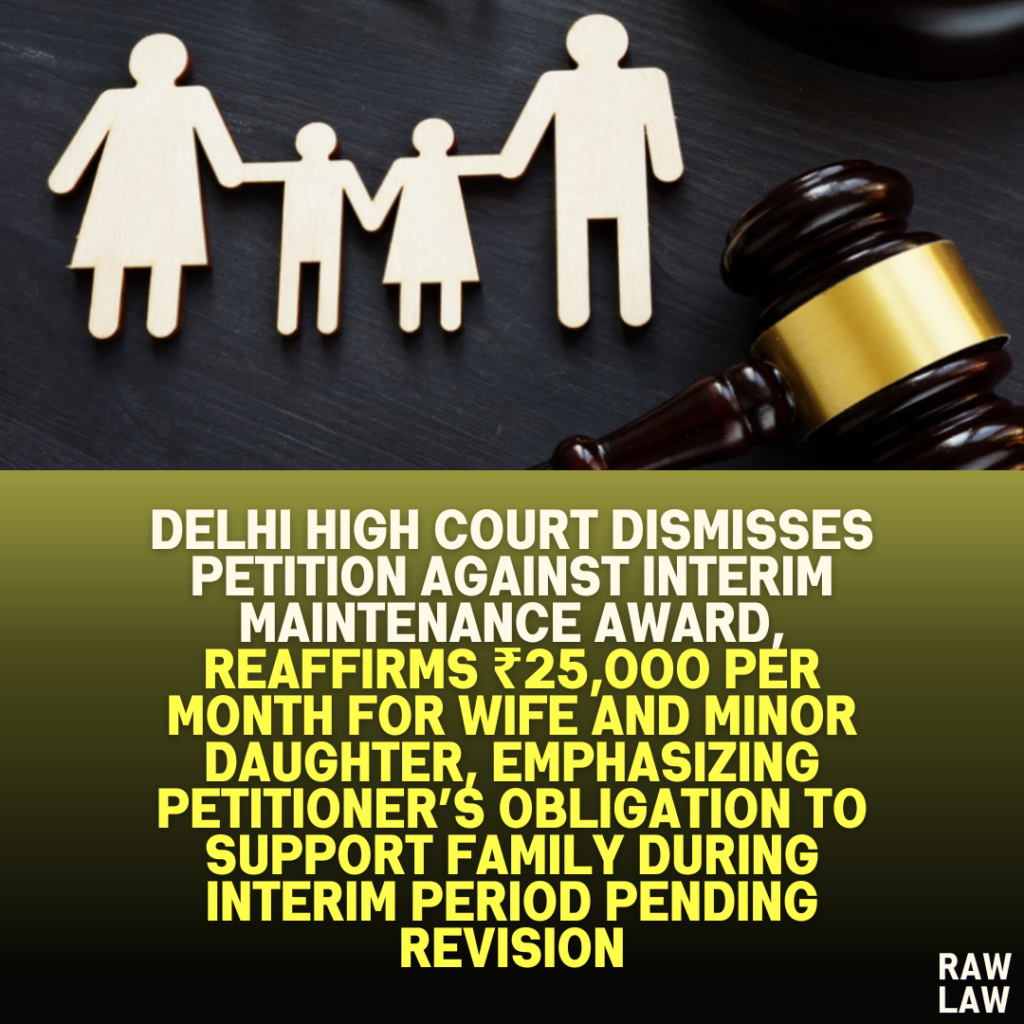Court’s Decision:
The Delhi High Court dismissed the petition challenging the interim maintenance order of ₹25,000 per month each to the wife and minor daughter, which was passed by the Mahila Court and affirmed by the Sessions Court. The High Court found no reason to interfere with the concurrent findings of fact by the lower courts and held that the maintenance awarded was justified based on the petitioner’s financial circumstances and responsibilities.
Facts:
- The petitioner and the respondent were married in 2007 and separated in 2017. They have a minor daughter.
- The respondent filed a petition under the Protection of Women from Domestic Violence Act, 2005, seeking maintenance.
- The Mahila Court, in 2018, awarded interim maintenance of ₹25,000 per month each for the respondent and the child, effective from August 2017.
- The petitioner challenged the order, claiming financial hardship due to unemployment and other financial commitments.
- The Sessions Court dismissed the petitioner’s appeal, leading to the petition before the High Court.
Issues:
- Whether the interim maintenance order was justified in light of the petitioner’s financial circumstances.
- Whether the petitioner’s employment status and financial commitments were adequately considered by the lower courts.
- Whether the respondent’s qualifications and ability to work should impact the maintenance award.
Petitioner’s Arguments:
- The petitioner argued that his employment ended in 2015 and that his income from various business ventures was inconsistent, making it difficult to comply with the maintenance order.
- He contended that he had been paying for the child’s school fees and medical expenses and had contributed to household expenses.
- He also argued that the respondent was equally qualified to earn, and her claim for maintenance was unjustified.
Respondent’s Arguments:
- The respondent’s counsel argued that the petitioner was involved in multiple business ventures and had significant earnings, contrary to his claims of financial hardship.
- The respondent maintained that the petitioner owned properties and led a high standard of living, as evidenced by bank statements and luxury expenditures.
- The respondent had no independent income and lived with her widowed mother, while the petitioner continued to reside in the jointly-owned house.
Analysis of the Law:
- The court considered the Supreme Court’s guidelines in Rajnesh v. Neha, focusing on the parties’ financial status and responsibilities in determining maintenance.
- It also referred to Rohtash Singh v. Ramendri, which clarified that maintenance is not awarded if the wife deserts the husband without reasonable cause, but no such evidence existed in this case.
- The court emphasized that interim maintenance is subject to revision, but the petitioner is obligated to support his family during the interim period.
Precedent Analysis:
- The court cited the Supreme Court’s decision in State of Kerala v. Puttumana Illath Jathavedan Namboodiri, which held that concurrent findings of fact by lower courts should not be disturbed unless there is clear error.
- It also referred to Sudhir Gupta v. Manisha Kumari, underscoring that well-reasoned lower court orders should not be interfered with unless they are perverse or not based on evidence.
Court’s Reasoning:
- The court found that the petitioner’s financial claims were not credible, as evidence showed significant business involvement and luxury expenditures, such as golf club memberships.
- The court rejected the petitioner’s argument of unemployment, finding that his financial situation was adequate to meet the maintenance obligations.
- The court held that the maintenance award was justified given the child’s needs and the significant disparity between the petitioner and respondent’s financial circumstances.
- The argument that the respondent was capable of earning was dismissed as irrelevant, given the petitioner’s much higher financial capacity.
Conclusion:
The High Court dismissed the petition and upheld the interim maintenance of ₹25,000 per month each for the respondent and their child. The court found that the lower court orders were well-reasoned, based on credible evidence, and supported by the petitioner’s ability to pay, rejecting claims of financial hardship.
